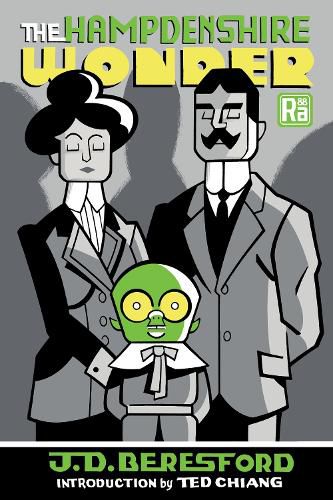Readings Newsletter
Become a Readings Member to make your shopping experience even easier.
Sign in or sign up for free!
You’re not far away from qualifying for FREE standard shipping within Australia
You’ve qualified for FREE standard shipping within Australia
The cart is loading…






In this pioneering science-fictional treatment of superhuman intelligence, a mutant wonder child's insights prove devastating.
In this pioneering science-fictional treatment of superhuman intelligence, a mutant wonder child's insights prove devastating.
Science fiction luminary Ted Chiang introduces The Hampdenshire Wonder, one of the genre's first treatments of superhuman intelligence. Victor Stott is a large-headed "supernormal" mutated in the womb by his parents' desire to have a child born without habits. Known as "the Wonder," Victor surveys humankind's science, philosophy, history, literature, religion-the best that has been thought and said-and dismisses it brutally- "So elementary . . . inchoate . . . a disjunctive patchwork." Rejecting "the interposing and utterly false concepts of space and time," the Wonder claims that life itself is merely "a disease of the ether." Unable to deal with the child's disenchanting insights, his adult interlocutors seek to silence him . . . perhaps permanently.
$9.00 standard shipping within Australia
FREE standard shipping within Australia for orders over $100.00
Express & International shipping calculated at checkout
In this pioneering science-fictional treatment of superhuman intelligence, a mutant wonder child's insights prove devastating.
In this pioneering science-fictional treatment of superhuman intelligence, a mutant wonder child's insights prove devastating.
Science fiction luminary Ted Chiang introduces The Hampdenshire Wonder, one of the genre's first treatments of superhuman intelligence. Victor Stott is a large-headed "supernormal" mutated in the womb by his parents' desire to have a child born without habits. Known as "the Wonder," Victor surveys humankind's science, philosophy, history, literature, religion-the best that has been thought and said-and dismisses it brutally- "So elementary . . . inchoate . . . a disjunctive patchwork." Rejecting "the interposing and utterly false concepts of space and time," the Wonder claims that life itself is merely "a disease of the ether." Unable to deal with the child's disenchanting insights, his adult interlocutors seek to silence him . . . perhaps permanently.